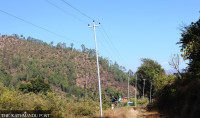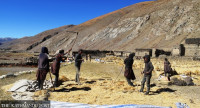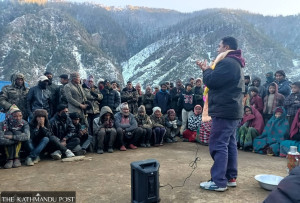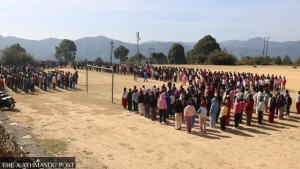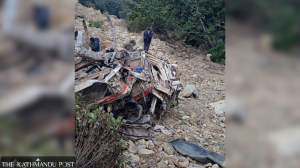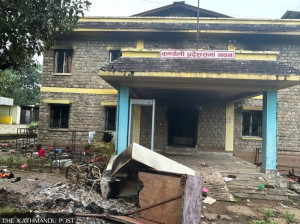Karnali Province
Patients deprived of free essential medicines at Mugu government health institutions
The District Hospital in Gamgadhi sends patients to private medical stores due to a shortage of medicines at the hospital.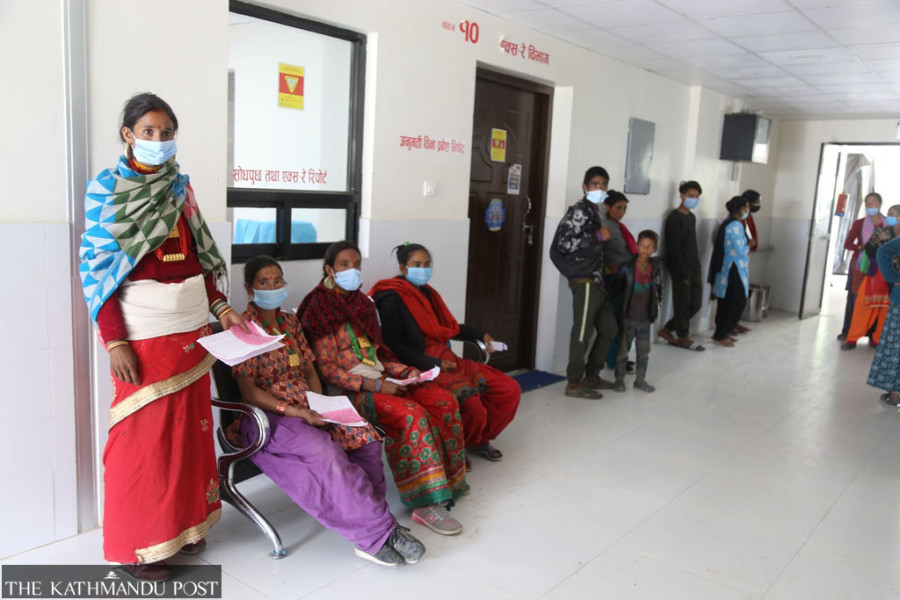
Raj Bahadur Shahi
On Sunday, 65-year-old Dhanapati Budha of Chhayanath Rara Municipality-13 reached the District Hospital in Gamgadhi, Mugu to get treatment for ear pain.
After getting his ear examined, Budha was asked to go to a private medical store to purchase medicines since the hospital did not have any.
The government has provisioned free medicines for patients in all government health institutions. But those visiting the District Hospital in Mugu have to purchase medicines from private pharmacies since the hospital has run out of essential drugs.
Satyadevi Shahi had also reached the District Hospital on Sunday with a high fever. She, too, was asked to go to a local pharmacy to buy medicines.
“The hospital did not even have medicines for fever,” said the 34-year-old resident of Soru Rural Municipality-4. “I had to buy medicines from elsewhere.”
The administration at the District Hospital, the only government hospital in Mugu, admits that it does not even have essential medicines to give to patients who come to the hospital seeking treatment.
“The yearly allocation for medicine is not enough to cover the increasing number of patients visiting the hospital,” said Gyan Singh Budha, acting health service manager of the District Health Office in Mugu.
The hospital receives around 100 patients on a daily basis.
“We are given a limited budget for medicines. We have to buy and manage medicines in every health institution within the budget. The medicines purchased with around Rs 10 million hardly last for three months,” said Gyan Singh.
According to him, the hospital receives a budget through the District Health Office to purchase a limited amount of medicines.
The shortage of essential medicines at the hospital has hit those from economically weak backgrounds hardest.
“The doctor advised me to purchase medicines from a private medical shop. This is not the first time I’ve been told to buy medicines. I have had to buy medicines on every visit,” said Shahi from Soru Rural Municipality. “I walked for four hours from Soru to receive treatment at the hospital in Gamgadhi. I had to borrow Rs 2,000 from a relative here to buy medicines.”
According to her, the health posts in her rural municipality also do not have essential medicines. “We go to government institutions to get free treatment and medicines but instead they tell us to buy medicines from private pharmacies.”
The Ministry of Health and Population provides more than 70 different types of medicines for communicable and non-communicable diseases to all district hospitals with at least 25 beds.
Patients are entitled to receive more than 60 types of essential medicines at primary healthcare centres and 35 types of drugs at health posts free of cost.
Kamal Shahi, a resident of Gamgadhi, says the District Hospital claims to be out of medicines all year around. “The hospital never has medicines. We always have to buy medicines from local medical shops,” Shahi said.
Every fiscal year, the Ministry of Health and Population provides Rs 2 million to the District Health Office to purchase medicines. However, in the last fiscal year, the office had purchased medicines worth Rs 8 million.
Among the four local units in Mugu, only Mugumkarmarong and Khatyad rural municipalities purchase medicines and distribute them to primary health institutions.
The residents of Chhayanath Rara Municipality and Soru Rural Municipality in Mugu have to buy medicines from private health stores in the absence of essential drugs in government health institutions.
“The local bodies do not allocate a budget to purchase medicines. We cannot distribute medicines in all health facilities in the district,” said Gyan Singh, acting health service manager at the District Health Office in Mugu.
According to him, there are 59 health posts, one primary health centre and one district hospital in Mugu.
Meanwhile, health officials in Mugu say the higher authorities do not distribute enough medicines in the district. Gyan Singh says that various health posts in Photu, Nera, Narthup and Jima in Soru Rural Municipality are always out of essential drugs.
“The health post in our village has neither health workers nor medicines,” Amrit Budha, a resident of Soru-4, told the Post. “The villagers of all 11 wards of Surukot Rural Municipality have to visit private clinics for treatment. None of the 16 primary health posts in the rural municipality has paracetamol or jibanjal (rehydration solution).”
All 17 health posts in Khatyad and 12 in Mugumkarmarong also face a shortage of essential medicines. This has led to the local people turning to traditional ways for treating illnesses, local residents say.
“We go to the hospital only when we are seriously ill. We can’t afford to go to health posts so we turn to faith healers,” said Norbu Tamang of Mugumkarmarong-6. “The health posts at Mugu, Dolphu and Kimri have not given any free medicines for the past year.”
Villagers are also deprived of health services, as the doctor and health workers at the primary health centre at Ratapani are not present most of the time, said Tamang.
There are a total of 120 posts of health workers at various health institutions across the district. But most health posts are left unmanned for a lack of staff and absenteeism among those present.




 18.12°C Kathmandu
18.12°C Kathmandu.jpg)




